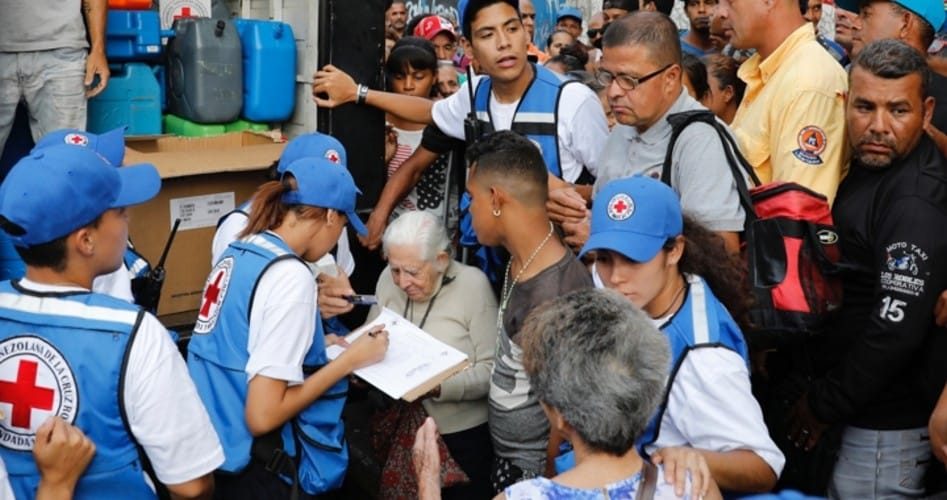
The International Red Cross (IRC) delivered 24 tons of medical supplies and 14 generators to Caracas’ airport bound for Venezuela’s hospitals on Tuesday. This was a de facto admission by Maduro’s socialist regime that it couldn’t provide even basic life-sustaining necessities for its people, the initial crack in Maduro’s facade of denial that his government is failing and a very public admission that, once again, socialism has failed to keep its promises of lifting people out of poverty.
Indeed, socialism has reduced what was once one of South America’s most prosperous countries to one filled with desperation, starvation, sickness, and death. According to spokesmen for the IRC, the delivery on Tuesday was just the start of a massive airlift of aid, which the agency said is targeting some 650,000 Venezuelans who are suffering the most.
The IRC wisely avoided making any political statements with the airlift. A spokesman said the critical medicines and generators “will be distributed in conformance with the fundamental principles of our movement, especially neutrality, impartiality and independence. Our mandate is to save lives.”
Juan Guaidó, Maduro’s opposite number who claims he is the country’s only legitimate president, was quick to take credit for the breakthrough: “Aid is entering because they [Maduro and his Marxist regime] destroyed the health system. It entered because we demanded it.” Henrique Capriles, a leading figure in support of Guaidó, tweeted: “Today, the first shipment of humanitarian aid arrived for our people. It’s a reality thanks to the pressure of Venezuelans and the support of our interim president Juan Guaidó and the legitimate National Assembly.”
And lots of help from the Trump administration, which has ramped up economic and political sanctions and pressures on Maduro’s failing regime. The final straw might have been those sanctions that followed Maduro’s success in stopping several hundred tons of humanitarian aid from entering his country from Colombia in February. As The New American reported at the time, those new sanctions were being applied to Cuba, and indirectly to Russia, hopefully forcing a “recalibration” of support by those two countries of Maduro’s failing regime.
The rolling disaster that characterizes Maduro’s failing regime can only partially be measured in terms of human suffering: A quarter of the country’s citizens are starving because they don’t have access to the basics such as food, medicines, clothing, and simple hygiene products. Infant mortality is skyrocketing, as are the deaths of the elderly living out their last days in hospitals that don’t have medicines, food, or even electricity. Nearly four million citizens have fled the country, some 5,500 every day. The economy, already in depression, is expected to fall by another 25 percent in 2019.
Whether Maduro will allow the supplies waiting on his country’s border with Colombia to enter remains to be seen. What is clearly seen is not only the success of socialism in driving a once-thriving country back to third-world status but the first fissure in the wall of resistance by Maduro to recognize reality and allow outside help for his people.
Those two messages delivered by the International Red Cross to Caracas on Tuesday could together represent the tipping point so many have been waiting for: that moment in time which signifies the beginning of the end of one of the most corrupt and oppressive socialist regimes observed in our time.
Photo: AP Images
An Ivy League graduate and former investment advisor, Bob is a regular contributor to The New American, writing primarily on economics and politics. He can be reached at [email protected].
Related article:
Venezuelan Crisis Deepens as U.S. Tries to Isolate Venezuela From Cuba, Russia



